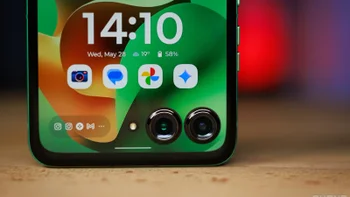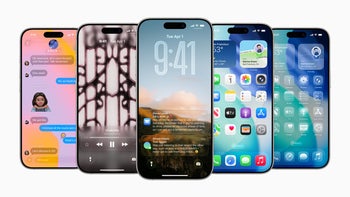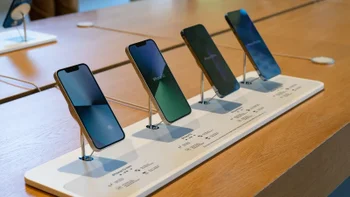Is T-Mobile's 5G strategy better than Verizon's? Not so fast, say these 4G vs 5G speed and coverage tests

Speaking at a virtual investor conference this week, T-Mobile's CTO Neville Ray mentioned that the deployment of Sprint's mid-band will happen much faster than expected, as the carriers have been prepping leases and and infrastructure beforehand with the hope that the merger goes through.
The current T-Mobile/Sprint 5G network merging in New York and Philadelphia is also happening on existing infrastructure that is being retrofitted with new equipment. The result?
Well, for Philadelphia, in particular, the area that the new combined T-Mobile/Sprint 5G network covers, is two and a half times larger than the Verizon 5G network's entire footprint nationwide.
Mr Ray also mentioned at Monday's investor talk yesterday that the new T-Mobile is moving at the pace of about a 1000 sites a month going into May and June which means that, by year's end, most major metro areas will be covered with the combined T-Mobile/Sprint 5G network layer cake.
Even by just using using 50-60 megahertz of Sprint's 2.5 GHz spectrum in the first two combined markets that were switched on - New York and Philadelphia - T-Mobile was able to achieve speeds that are five times faster than the 4G LTE fallback, and, as mentioned, provide a coverage map for them larger than Verizon's entire 5G mmWave coverage.
T-Mobile vs Verizon vs Sprint and AT&T 4G LTE and 5G speeds and coverage in Philadelphia
The new T-Mobile flipped the switch on its "layer cake" 5G coverage in Philly just in the last few weeks, however, but before the coronavirus lockdown, or the announcement of the Sprint/T-Mobile merger, the testing analysts from RootMetrics tried to get a snapshot of the 4G/5G coverage and speed situation in Philadelphia.
Why? It was one of the few areas with 5G coverage from all major carriers, and, naturally, became a battleground of speed and coverage claims. Here's a snapshot of the findings on the speed of the networks, juxtaposing the 4G and 5G marks:
| 5G median download speed (Mbps) | 4G LTE median download speed (Mbps) | |
|---|---|---|
| AT&T | 94.5 Mbps | 79.2 Mbps |
| Sprint | 40.9 Mbps | 31.4 Mbps |
| T-Mobile | 41.0 Mbps | 25.3 Mbps |
| Verizon | 239.6 Mbps | 50.7 Mbps |
- At the remarkable 239.6 Mbps, Verizon’s mmWave easily clocked the fastest 5G median download speed in Philadelphia.
- AT&T offered strong speeds on both 4G LTE and 5G. AT&T’s 94.5 Mbps median download 5G speed was stronger than what we saw from Sprint and T-Mobile, and AT&T’s 4G LTE median download speed was the fastest of all four carriers, at 79.2 Mbps.
- Speed is important, but so is availability. Availability percentages can vary wildly depending on 5G spectrum used. Verizon’s mmWave 5G doesn’t travel as far or penetrate solids as well and is typically used in busy city centers, event venues, and urban hotspots. The low-band spectrum used by AT&T and T-Mobile and the mid-band spectrum used by Sprint offer broader coverage but slower speeds than mmWave.
When it comes to said availability, the Achilles heel of mmWave networks like Verizon's is their miniscule coverage. Base stations have to be situated every 1000 feet or so in dense urban areas, whereas Sprint's mid- and T-Mobile's low-bands can produce signal that travels much farther. That explains the 5G availability numbers in the city that you see below, and the RootMetrics availability findings: - Verizon’s 5G availability not a surprise and not necessarily a worry. Given the propagation characteristics of mmWave spectrum, Verizon has targeted its 5G deployments to specific sections of cities that will benefit most from greater capacity. When 5G isn’t available you’ll still find fast speeds on Verizon’s 4G LTE in Philadelphia, with the carrier clocking a strong 4G LTE median download speed of 50.7 Mbps. In fact, Verizon’s LTE median download speed was faster than the 5G median download from both Sprint and T-Mobile.
- T-Mobile 5G availability high but speeds a bit slower. T-Mobile offered the most 5G availability at 31.2%, but its median download 5G speed (41.0 Mbps) was slower than the LTE median download speeds we recorded for AT&T and Verizon.
| 5G availability | |
|---|---|
| AT&T | 1.6% |
| Sprint | 5.7% |
| T-Mobile | 31.2% |
| Verizon | 0.3% |
As you can see, the new T-Mobile's enhanced 5G coverage in Philadelphia already comes from a position of strength. The combined Sprint and T-Mobile 5G network blanketed almost 38% of Philly even before merging the bands and the layered cake strategy was introduced to the city.
With the 2.5GHz band at its disposal, no wonder that T-Mobile now boasts how its Philadelphia 5G network alone beats Verizon's nationwide mmWave coverage area. Verizon, however, will be flipping the switch on its own lower bands later in the year, so expect more movers and shakers when it comes to 5G claims.
The thing is, however, that in areas where T-Mobile and Sprint have a 5G network, its median speeds are actually a bit slower than Verizon's 4G LTE fallback which sort of negates a major part of the touted next-gen network advantages.
Granted, you can expect lower latency and a lot more devices hooked up on the same tower or base station but, for now, we are mainly using 5G with our phones, and there the speed tests are about the only visible difference if we are on 4G or 5G, so Verizon's strategy is not without its merits despite the "layered cake" bombast coming from the new T-Mobile.
In any case, we'd love to see the next iteration of the great 5G war in Philly that takes into account the fresh 2.5GHz deployments of the new T-Mobile that could change the equation in its favor.
Follow us on Google News













Things that are NOT allowed:
To help keep our community safe and free from spam, we apply temporary limits to newly created accounts: